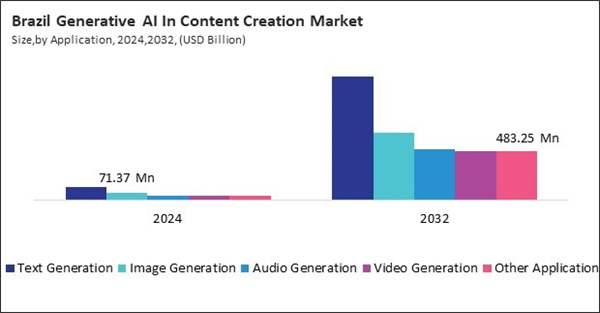The Brazil market dominated the LAMEA Generative AI In Content Creation Market by country in 2024, and is expected to continue to be a dominant market till 2032; thereby, achieving a market value of $3.32 billion by 2032. The Argentina market is showcasing a CAGR of 35.1% during 2025-2032. Additionally, the UAE market would register a CAGR of 32.5% during 2025-2032.
Technological advancements and open access to foundational AI models are also shaping the trajectory of this market. Innovations in transformer architecture, improved training methods, and increased computational power have drastically enhanced the creative capabilities of generative models. The availability of open-source models has further catalyzed innovation, allowing developers and organizations to fine-tune models for specific use cases.
However, alongside the opportunities, the market also faces challenges that influence its growth and acceptance. Concerns about intellectual property, misinformation, and the authenticity of AI-generated content have led to debates around regulatory frameworks and ethical guidelines. Content creators and legal experts are calling for transparency in AI usage, including disclosure of AI involvement in content production.
Brazil's engagement with Generative Artificial Intelligence (AI) in content creation has been marked by significant strides in recent years. The country's vast digital landscape, coupled with a burgeoning tech-savvy population, has created a fertile ground for AI-driven innovations. The Brazilian government's proactive approach, exemplified by the launch of the Brazilian Artificial Intelligence Plan (2024-2028), underscores its commitment to fostering AI development. This plan emphasizes ethical AI usage, transparency, and the establishment of a National Centre for Algorithmic Transparency and Trustworthy AI, aiming to position Brazil as a leader in responsible AI deployment.
Argentina is rapidly emerging as a significant player in the generative AI landscape, particularly in content creation. The country's strategic focus on artificial intelligence is evident through its national AI strategy, which aims to foster AI development while adhering to ethical and legal standards. This strategy aligns with the Sustainable Development Goals (SDGs) and includes various policy instruments such as governance frameworks, financial support, and incentives for AI enablers. Key factors influencing the growth of generative AI in Argentina include a robust startup ecosystem, a strong pool of tech talent, and supportive government policies.
The United Arab Emirates (UAE) has emerged as a significant player in the adoption and advancement of Generative Artificial Intelligence (AI) for content creation. The nation's strategic investments and forward-thinking policies have positioned it at the forefront of AI innovation in the Middle East. The UAE's commitment to becoming a global AI hub is evident through initiatives like the establishment of the Mohamed bin Zayed University of Artificial Intelligence (MBZUAI) and the launch of large-scale AI projects. These efforts underscore the country's dedication to integrating AI into various sectors, including media, education, and marketing.
Saudi Arabia is rapidly positioning itself as a global leader in generative artificial intelligence (AI), particularly in content creation. Under the ambitious Vision 2030 initiative, the Kingdom aims to diversify its economy beyond oil by investing heavily in technology and innovation. The establishment of the Saudi Data and Artificial Intelligence Authority (SDAIA) underscores this commitment, with the authority spearheading the National Strategy for Data and AI to elevate Saudi Arabia as a data-driven economy. Key factors influencing the growth of generative AI in Saudi Arabia include substantial government investment, strategic international partnerships, and a focus on developing local talent. Therefore, With strategic investments, ethical frameworks, and visionary national agendas, Latin America and the Middle East are emerging as dynamic hubs for generative AI in content creation.
List of Key Companies Profiled
- Adobe, Inc.
- Autodesk, Inc.
- Coherent Corp.
- Google LLC (Alphabet Inc.)
- Jasper AI, Inc.
- Microsoft Corporation
- NVIDIA Corporation
- OpenAI, LLC
- Samsung Electronics Co., Ltd. (Samsung Group)
- CopyAI, Inc.
Market Report Segmentation
By Component
- Software
- Services
By Application
- Text Generation
- Image Generation
- Audio Generation
- Video Generation
- Other Application
By Industry
- Entertainment & Media
- Marketing & Advertising
- E-commerce
- Healthcare
- Other Industry
By Country
- Brazil
- Argentina
- UAE
- Saudi Arabia
- South Africa
- Nigeria
- Rest of LAMEA
Table of Contents
Companies Mentioned
- Adobe, Inc.
- Autodesk, Inc.
- Coherent Corp.
- Google LLC (Alphabet Inc.)
- Jasper AI, Inc.
- Microsoft Corporation
- NVIDIA Corporation
- OpenAI, LLC
- Samsung Electronics Co., Ltd. (Samsung Group)
- CopyAI, Inc.









